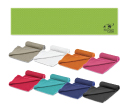Body Language Tips for Success
Whether you are interviewing for a job position or engaging in regular business communications, it is always important to keep your body language in mind. The actions and positions you take can influence the impression you are giving to others you meet. Some body language positions may inadvertently be sending the wrong message.
Body Language to Avoid:
There are several body language signs that you may already know or have heard about that can send negative signals to others. Postures such as crossing your arms, slouching, or standing with your hands on your hips can all have negative consequences. However did you know to avoid these behaviours too?
- Don’t cross your ankles while standing. It can make you seem shy or even insignificant, explains executive coach Sharon Sayler. Stand straight with good posture to show you are important and confident.
- Do not use the “fig leaf” position, which is when you put your hands over your groin area when sitting. This can give the impression that you are unimportant. Keep your hands by your side or on the desk, uncrossed.
- Don’t tilt your head to the side when listening to someone. It can be misinterpreted as being confused. Instead, nod your head slightly to show that you understand or agree.
- Be aware of your body language and avoid nervous habits. Make sure you aren’t chewing gum, tapping a pencil, or shaking your legs. These are very distracting to others and can be misinterpreted to mean a number of different negative things.
Body Language to Use:
It is important to find that balance or the “sweet spot” for body language that is assertive and confident but not overly commanding or imposing.
- Maintain good eye contact. If you don’t look straight at someone, it can come off as shy, coy, or even can look as if you are hiding something. It can be hard to achieve the right level of eye contact, so if this is a challenge for you, then practice with a co-worker, friend, or loved one that can give you objective criticism and feedback.
- Keep breathing. This may sound silly, but when you are conversing and it might be a high stress or nervous situation, you can easily get overwhelmed. Stay calm and remember to breathe.
- Use your hands to help indicate your gestures and meaning. Without being overly “talkative with your hands” you can show more expression with your hands. This also applies to phone meetings and phone interviews, if you stand up and use your hands, that energy will come across through the phone much in the same way that you can tell when someone is smiling over the phone.


















